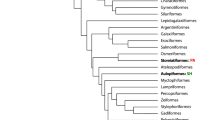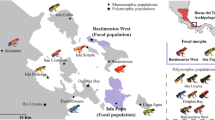Abstract
Although counterintuitive at first sight, filial cannibalism is common in the animal kingdom and has been recognized as a mechanism to increase the cannibalizing parent’s lifetime reproductive success. However, previous evidence is often inconclusive and the adaptiveness of filial cannibalism is still not fully understood. We here address the notion that parents do not cannibalize at random but preferably consume offspring with a particular phenotype. To assess if differences in developmental stage and thus reproductive value of eggs trigger such selectivity, we experimentally presented male common gobies (Pomatoschistus microps) with two differently aged egg clutches within mixed broods. We found that males consumed significantly more young than old eggs. This result indicates that parents are not only able to discriminate between eggs based on developmental stage, but might use this to reduce the cost of partial filial cannibalism by selectively removing eggs of lower reproductive value.


Similar content being viewed by others
References
Andrén MN, Kvarnemo C (2014) Filial cannibalism in a nest-guarding fish: females prefer to spawn in nests with few eggs over many. Behav Ecol Sociobiol 68:1565–1576
Bates D, Maechler M, Bolker B, Walker S (2014) lme4: Linear mixed-effects models using Eigen and S4, http://CRAN.R-project.org/package=lme4
Baylis JR (1981) The evolution of parental care in fishes, with reference to Darwin’s rule of male sexual selection. Environ Biol Fish 6:223–251
Chin-Baarstad A, Klug H, Lindström K (2009) Should you eat your offspring before someone else does? Effect of an egg predator on filial cannibalism in the sand goby. Anim Behav 78:203–208
Crawley MJ (2007) The R book. John Wiley & Sons, Chichester, England
Forsgren E, Karlsson A, Kvarnemo C (1996) Female sand gobies gain direct benefits by choosing males with eggs in their nests. Behav Ecol Sociobiol 39:91–96
Frommen JG, Brendler C, Bakker TCM (2007) The tale of the bad stepfather: male three-spined sticklebacks Gasterosteus aculeatus L. recognize foreign eggs in their manipulated nest by egg cues alone. J Fish Biol 70:1295–1301
Gilbert SF (1985) Developmental biology. Sinauer Associates, Sunderland, MA
Goldschmidt T, Bakker TCM, Feuth-de Bruijn E (1993) Selective copying in mate choice of female sticklebacks. Anim Behav 45:541–547
Heubel KU, Lindström K, Kokko H (2008) Females increase current reproductive effort when future access to males is uncertain. Biol Lett 4:224–227
Jones JC, Reynolds JD (1999) Costs of egg ventilation for male common gobies breeding in conditions of low dissolved oxygen. Anim Behav 57:181–188
Klug H, Alonzo SH, Bonsall MB (2012) Theoretical foundations of parental care. In: Royle NJ, Smiseth PT, Kölliker M (eds) The evolution of parental care. Oxford University Press, Oxford, pp 21–39
Klug H, Bonsall MB (2007) When to care for, abandon, or eat your offspring: the evolution of parental care and filial cannibalism. Am Nat 170:886–901
Klug H, Lindström K (2008) Hurry-up and hatch: selective filial cannibalism of slower developing eggs. Biol Lett 4:160–162
Korner-Nievergelt F, Roth T, von Felten S, Guélat J, Almasi B, Korner-Nievergelt P (2015) Bayesian data analysis in ecology using linear models with R, BUGS, and Stan. Academic Press, London
Kvarnemo C (2010) Parental care. In: Westneat DF, Fox CW (eds) Evolutionary behavioral ecology. Oxford University Press, New York, pp 451–467
Lindström K, Hellström M (1993) Male size and parental care in the sand goby, Pomatoschistus minutus. Ethol Ecol Evol 5:97–106
Loiselle PV (1983) Filial cannibalism and egg recognition by males of the primitively custodial teleost Cyprinodon macularius californiensis Girard (Atherinomorpha: Cyprinodontidae). Ethol Sociobiol 4:1–9
Manica A (2002) Filial cannibalism in teleost fish. Biol Rev 77:261–277
Manica A (2003) The effect of brood size and age on partial filial cannibalism in the scissortail sergeant. J Fish Biol 63:37–47
Manica A (2004) Parental fish change their cannibalistic behaviour in response to the cost-to-benefit ratio of parental care. Anim Behav 67:1015–1021
Marconato A, Bisazza A (1986) Males whose nests contain eggs are preferred by female Cottus gobio L. (Pisces, Cottidae). Anim Behav 34:1580–1582
Mehlis M, Bakker TCM, Engqvist L, Frommen JG (2010) To eat or not to eat: egg-based assessment of paternity triggers fine-tuned decisions about filial cannibalism. Proc R Soc Lond B 277:2627–2635
Mehlis M, Bakker TCM, Frommen JG (2009) Nutritional benefits of filial cannibalism in three-spined sticklebacks (Gasterosteus aculeatus). Naturwissenschaften 96:399–403
Nyman KJ (1953) Observations on the behaviour of Gobius microps. Acta Soc Fauna Flora Fenn 69:1–11
Petersen CW, Marchetti K (1989) Filial cannibalism in the Cortez damselfish Stegastes rectifraenum. Evolution 43:158–168
Polis GA (1981) The evolution and dynamics of intraspecific predation. Annu Rev Ecol Syst 12:225–251
Pressley PH (1981) Parental effort and the evolution of nest-guarding tactics in the threespine stickleback, Gasterosteus aculeatus L. Evolution 35:282–295
R Core Team (2014) R: a language and environment for statistical computing. R Foundation for Statistical Computing, Vienna, Austria, https://www.r-project.org
Rohwer S (1978) Parent cannibalism of offspring and egg raiding as a courtship strategy. Am Nat 112:429–440
Sargent RC (1992) Ecology of filial cannibalism in fish: theoretical perspectives. In: Elgar MA, Crespi BJ (eds) Cannibalism: ecology and evolution among diverse taxa. Oxford University Press, Oxford, pp 38–62
Sikkel PC (1989) Egg presence and developmental stage influence spawning-site choice by female garibaldi. Anim Behav 38:447–456
Sikkel PC (1994) Filial cannibalism in a paternal-caring marine fish: the influence of egg developmental stage and position in the nest. Anim Behav 47:1149–1158
Takegaki T, Yoshimoto Y, Matsumoto Y (2011) Filial cannibalism in the barred-chin blenny Rhabdoblennius ellipes: males do not preferentially eat young eggs. J Ethol 29:395–400
Vallon M, Grom C, Kalb N, Sprenger D, Anthes N, Lindström K, Heubel KU (2016) You eat what you are: personality-dependent filial cannibalism in a fish with paternal care. Ecol Evol (doi: 10.1002/ece3.1966)
Zuur A, Ieno EN, Walker N, Saveliev AA, Smith GM (2009) Mixed effects models and extensions in ecology with R. Springer, New York
Acknowledgments
We thank the staff of Tvärminne Zoological Station for logistical support, Silke Probst for counting fish eggs, Nils Anthes for statistical advice and discussions, and Nils Anthes, Ines Häderer, and Tobias Gerlach for valuable comments on the manuscript. This project was financially supported by a grant from the Volkswagen foundation to KUH (grant number I/84 846).
Author information
Authors and Affiliations
Corresponding author
Ethics declarations
Conflict of interest
The authors declare that they have no competing interests.
Ethical approval
The study complies with all the relevant laws of Finland and was approved by Finnish authorities. All procedures were declared as class 0 experiments and inspected and approved by ELLA, Animal Experimental Board in Finland on site at Tvärminne zoological station in Hanko, Finland.
Additional information
Communicated by J. Lindström
Significance statement Cannibalizing some of one’s own eggs instead of caring for them can be seen as an extreme form of strategically redirecting parental investment to the remaining offspring. This is the first controlled experiment confirming the prediction that animal parents caring for mixed broods with eggs of different developmental stages should preferentially eat the younger, to the parent less valuable eggs.
Rights and permissions
About this article
Cite this article
Vallon, M., Heubel, K.U. Old but gold: males preferentially cannibalize young eggs. Behav Ecol Sociobiol 70, 569–573 (2016). https://doi.org/10.1007/s00265-016-2074-6
Received:
Revised:
Accepted:
Published:
Issue Date:
DOI: https://doi.org/10.1007/s00265-016-2074-6




